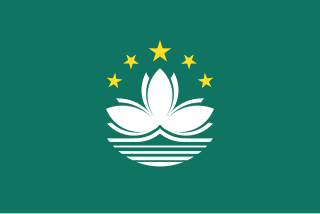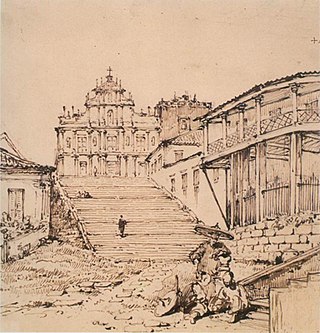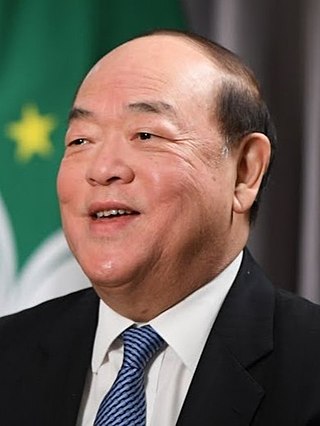Contents
| |
1838 • 1839 •1840 • 1841 • 1842 |
| Decades: |
| See also: History of Macau |
This article needs additional citations for verification .(February 2024) |
Events from the year 1840 in Portuguese Macau .
| |
1838 • 1839 •1840 • 1841 • 1842 |
| Decades: |
| See also: History of Macau |
This article needs additional citations for verification .(February 2024) |
Events from the year 1840 in Portuguese Macau .

Macau or Macao is a special administrative region of the People's Republic of China. With a population of about 680,000 and a land area of 32.9 km2 (12.7 sq mi), it is the most densely populated region in the world.

Macau is a special administrative region (SAR) of the People's Republic of China. It was leased to Portugal in 1557 as a trading post in exchange for a symbolic annual rent of 500 tael. Despite remaining under Chinese sovereignty and authority, the Portuguese came to consider and administer Macau as a de facto colony. Following the signing of the Treaty of Nanking between China and Britain in 1842, and the signing of treaties between China and foreign powers during the 1860s, establishing the benefit of "the most favoured nation" for them, the Portuguese attempted to conclude a similar treaty in 1862, but the Chinese refused, owing to a misunderstanding over the sovereignty of Macau. In 1887 the Portuguese finally managed to secure an agreement from China that Macau was Portuguese territory. In 1999 it was handed over to China. Macau was the last extant European territory in continental Asia.

Demographic features of the population of Macau include population density, ethnicity, education level, health of the populace, economic status, religious affiliations and other aspects of the population.
The Macanese people are a multiracial East Asian ethnic group that originated in Macau in the 16th century, consisting of people of predominantly mixed Cantonese and Portuguese as well as Malay, Japanese, English, Dutch, Sinhalese, and Indian ancestry.

The Macanese pataca or Macau pataca is the currency of the Macao Special Administrative Region of the People's Republic of China. It is subdivided into 100 avos, with 10 avos called ho (毫) in Cantonese.

Macau law is broadly based on Portuguese law, and therefore part of the civil law tradition of continental European legal systems. Portuguese law is itself highly influenced by German law. However, many other influences are present, including Chinese law, Italian law, and some narrow aspects of common law.

Hengqin is an island that lies mostly in Zhuhai, a prefecture-level city and special economic zone in Guangdong Province of the People's Republic of China. It has a population of about 3,000. Parts of Hengqin are leased to Macau by the State Council of the People's Republic of China, starting from 2009, mostly to house the new campus of the University of Macau. In the leased parts of the island, Macau law applies.
Macanese cuisine is mainly influenced by Chinese cuisine, especially Cantonese cuisine and European cuisine, especially Portuguese cuisine and influences from Southeast Asia and the Lusophone world, due to Macau's past as a Portuguese colony and long history of being an international tourist gambling centre.

The two Autonomous Regions of Portugal from 1999 are the Azores and Madeira. Together with Continental Portugal, they form the Portuguese Republic.

TDM - Teledifusão de Macau, S. A. provides public broadcasting services in Macau. By running five digital terrestrial television channels, one satellite television channel and two radio channels, TDM provides local audiences with a wide range of content in Macau's two official languages, Chinese (Cantonese) and Portuguese, as well as having time-slots for English as well as Indonesian and Tagalog, which reflects the multicultural nature of the city, with 95 percent of the population being Chinese and five percent made up of Portuguese and other ethnic groups.

Islam in Macau is a minority religion in the region. According to the Islamic Union of Hong Kong, together with all of the foreign Muslim workers combined, there are around 10,000 Muslims in Macau. Only around 400 are local Macanese people, and they are collective known as The Macau Islamic Society.

The handover of Macau from the Portuguese Republic to the People's Republic of China was at midnight on 20 December 1999. This event ended 442 years of Portuguese rule in the former settlement, which began in 1557.

Macanese Portuguese is a Portuguese dialect spoken in Macau, where Portuguese is co-official with Cantonese. Macanese Portuguese is spoken, to some degree either natively or as a second language, by roughly 2.3% of the population of Macau. It should not be confused with Macanese language, a distinct Portuguese creole that developed in Macau during the Portuguese rule.
The Macau Open Badminton Championships is an open international championship in badminton held in Macau. In the 2002 International Badminton Federation (IBF) calendar, the first badminton tournament in Macau was held as Macau Satellite. IBF then included the tournament in the Grand Prix event in 2006, after that the tournament was categorised by the Badminton World Federation as Grand Prix Gold event in 2007, which carried a total prize money of US$120,000. After the new event structure updated by the BWF in 2017, the Macau Open categorized as the BWF World Tour Super 300 which began to be implemented in 2018. The Macau Open was on hiatus due to the COVID-19 pandemic starting from 2020 to 2023, and will return to the BWF calendar in 2024.

The Sino-Portuguese Treaty of Peking was a trade unequal treaty between the Kingdom of Portugal and the Qing dynasty of China, signed on 1 December 1887. It is counted by the Chinese as among the unequal treaties in the aftermath of the Second Opium War. The treaty gave Portugal perpetual colonial rights to Macau on the condition that Portugal would cooperate in efforts to end the smuggling of opium.

The Public Security Police Force is the non-criminal police department of Macau and a branch of the Macau Security Force. Originally known at first as the Macau Police, the force went through several name changes before taking on its current name. The PSP celebrates its foundation on 14 March 1691.

The Liaison Office of the Central People's Government in the Macao Special Administrative Region is the representative office of the State Council of the People's Republic of China in Macau.

Macau was a Portuguese colony from the establishment of the first official Portuguese settlement of Macau in 1557 to its handover to China in 1999. It comprised the Municipality of Macau and the Municipality of Ilhas. Macau was both the first and last European holding in China.

Ho Iat Seng is a Macau politician serving as the third and current chief executive of Macau since December 2019.

Prostitution is legal in Macau unlike in mainland China, because the city is a special administrative region of the country. However, operating a brothel and procuring are both illegal in Macau, with the latter punishable by a maximum jail sentence of 8 years. Street prostitution is illegal but sex work in a massage parlor is considered to be de facto legal. The city has a large sex trade despite there being no official red-light district. In addition to street prostitution, prostitutes work in low-rent buildings, massage parlours and illegal brothels, and the casinos, nightclubs, saunas and some of the larger hotels. Most hotels, however, have suspected prostitutes removed from the premises. Many of the city's sidewalks and underpasses are littered with prostitutes' calling cards.